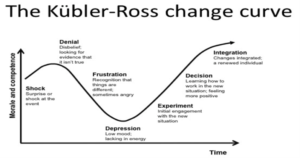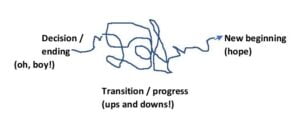This week, my friends have been checking in with me to see how I am managing the latest change in my life – the change away from being a service provider to now being ‘Mum’. Honestly, I think I am doing pretty well. I know I have said this on many occasions, I am very aware of how confronting change can be, particularly when I am not in control of what is happening. The truth is, I have been working through the implications of the changes for over a year now. I have had plenty of time to adapt.
Just this week, one of the people I follow also talked about change. He used the Kübler-Ross curve to clearly explain how change can evolve in any particular situation, whether that is organisational or personal. The curve looks like the following:

Considering this, I thought about my journey over the past year. The ending of one part of my life, which I found very important, then progressing and working my way through a transition phase before arriving at a point where new beginnings may be possible. I think my change curve looks more like the following:

Change in relationships and our work can often feel like death is occurring – of our dreams, of what we hoped to achieve, of what is important to us.
Some people cope better with change than other people do. The truth is we may not know how we will manage it until something is thrust upon us. Ironically, the thing which causes us the most grief is never what we expect. I remember the pain I felt when I sold my RTO, lost my ‘Gitana’ identity, and also when Poppy, my toy poodle, died. I never expected these things to have caused the most anguish and sorrow.
This week’s discussions, not only with my friends but also work colleagues, revolved around how to help staff and other people cope with change following audits and assessments, particularly when they are needed to improve the policy and practice. Sometimes staff welcome the changes, and at other times they do not, particularly when they think the changes are ridiculous or irrelevant to what is truly important, i.e. the care and support of their clients. Talking to managers this week about how they support staff as well as themselves through change, we discussed the benefits of being more mindful about the ways different people progress from one point to another in the change process. And the fact that an ending has to occur before new beginnings may be found. It’s a journey in many ways, and people travel the change pathway at their own time.
Is it worth supporting people on that pathway and walking alongside them as they unpack what the change will ultimately mean to them? Perhaps some people will say it’s worth taking the time because we are dealing with people – and who knows when we, too, may need support coping with change ourselves? Other people may say it’s OK to be unaware of the impact of change on other people, not caring what it means to people while still expecting the job to get done with minimum fuss. There will always be people who operate in a mindful way and in a more casual or perhaps ruthless way when managing change.
Personally, I think time to listen, time to care, time to be mindful of where people are at as they progress through change is critical in today’s world. As Heraclitus, a Greek philosopher once quoted, “change is the only constant in life.” What I also know to be true is that “nothing ever stays the same – this too shall pass”. It is all in how we look at it!
Thinking ahead:
- Do you think about the different stages people go through with when you need to implement something new in your life or your work?
- How do you assist other people in managing change that they do not want to implement?
- Who supports you through the change process?

